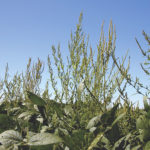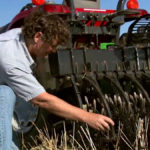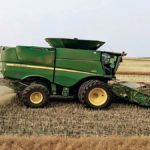Tag Archives weed control

New option launched to manage resistant weeds in soybeans
Enlist E3 soybeans are resistant to multiple herbicides meaning more options to deal with weed issues

Glyphosate resistant waterhemp moving across Ontario
With its method of pollination and resistance abilities, the weed is becoming harder to control

Plant stress makes early-season weed control critical
Research shows corn and soybeans can sense the presence of weeds even before emergence

Evaluating mechanical weed control options
Researchers found that when two methods are used, weed control improves

Seed terminator installed on combine
An Australian brought the system when he moved to Canada
SWAC 2019 conference: The Road Ahead
What to see and look for at the 2019 Southwest Agricultural Conference

Edible bean growers could get more weed control options
Ridgetown College research shows that older chemistries can help control glyphosate-resistant weeds in strip till

Glyphosate drives long-term herbicide changes
Ontario keeps track of detailed herbicide use every five years, which shows how the use of active ingredient has declined


